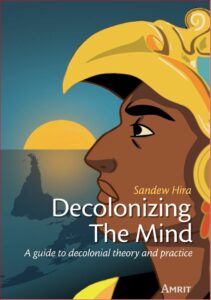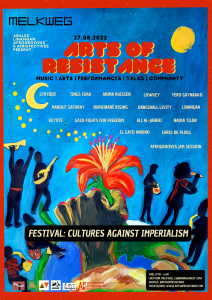Sandew Hira, November 2, 2022
The motive for a nuclear war
The world is at the threshold of a nuclear disaster. The driving force behind this is NATO, not Russia, Iran, North Korea or China. NATO, led by the US, is pushing for a nuclear war. Currently, only the United States supported by Western governments have the motive to start a war that develops into a nuclear war. Successive presidents have argued that United States should be the policeman of the world.
George W. Bush proclaimed in 2006: “The only alternative to American leadership is a dramatically more dangerous and anxious world.”[1]
Barrack Obama said in 2014: “Those who argue otherwise — who suggest that America is in decline, or has seen its global leadership slip away — are either misreading history or engaged in partisan politics… America must always lead on the world stage. If we don’t, no one else will. The military … is and always will be the backbone of that leadership.”[2]
In 2020 Donald Trump brought to world to the brink of an all out war with Iran with assassination of Iranian general Qasem Soleimani in 2020. That war would easily have developed into a broad regional war. Despite his isolationist rhetoric and actions expressed the US withdrawal from international accords such as the Iran Nuclear deal and the Paris Climate Accords Donald Trump was ready to use military force to enforce US dominance in the world.
President Joe Biden said in 2022: “There’s going to be a new world order out there, and we’ve got to lead it.”[3]
The US is the only state in the world with the explicit goal of maintaining a global dominance of the world. That goal is supported by military means. The US has 800 military bases across the globe. They are not meant to protect the US from foreign invasions. They are there to maintain US hegemony over the world. Conservative scholar Robert Kagan puts it like this: “There is the matter of American hard power. What has been true since the time of Rome remains true today: there can be no world order without power to preserve it, to shape its norms, uphold its institutions, defend the sinews of its economic system, and keep the peace…. If the United States begins to look like a less reliable defender of the present order, that order will begin to unravel. It remains true today as it has since the Second World War that only the United States has the capacity and the unique geographical advantages to provide global security. There can be no stable balance of power in Europe or Asia without the United States. And while we can talk about soft power and smart power, they have been and always will be of limited value when confronting raw military power.”[4]
What will happen if a government refuses to accept US military, economic and political dominance? Then the US will use any means necessary to bring down that government: destabilization, economic boycott, coup d’état and ultimately a military invasion. And this is all supported by a simple narrative: it is about the struggle between good and evil and the US represent good and its adversary represent evil. The storyline is communicated through every mainstream media and is part of the colonization of the mind.
The US is preparing for World War III. It sees China, Russia, Iran and the Democratic People’s Republic of Korea (DPRK) as its main enemies. In its Annual Threat Assessment of 2021 the US Intelligence Community laid down it view of the factors that might lead to of a future military confrontation: “Beijing, Moscow, Tehran, and Pyongyang have demonstrated the capability and intent to advance their interests at the expense of the United States and its allies, despite the pandemic. China increasingly is a near-peer competitor, challenging the United States in multiple arenas—especially economically, militarily, and technologically—and is pushing to change global norms. Russia is pushing back against Washington where it can globally, employing techniques up to and including the use of force. Iran will remain a regional menace with broader malign influence activities, and North Korea will be a disruptive player on the regional and world stages. Major adversaries and competitors are enhancing and exercising their military, cyber, and other capabilities, raising the risks to US and allied forces, weakening our conventional deterrence, and worsening the longstanding threat from weapons of mass destruction.”[5]
In other words: these four countries are challenging US hegemony on a regional and global scale in different terrains: economically, militarily en technologically. The only way to break that challenge is not by soft talk, but by hard power.
The preparation
In 2021 there were nine countries with nuclear arms: China, DPRK (North Korea), France, India, Israel, Pakistan, Russia, the United Kingdom and the United States. Together they have more than 13,080 nuclear weapons. Russia and the US together possess 80% of all nuclear heads: Russia has 6,255 and the US 5,550. China has 350, DPRK 40-50 and Israel 90. The US hosts part of its nuclear weapons in five countries: Belgium, Germany, Italy, the Netherlands and Türkiye .[6]
Two US political scientists, Keira Lieber and Daryl Press have built a computer model to simulate a hypothetical U.S. attack on Russia’s nuclear arsenal using the standard unclassified formulas that defense analysts have used for decades. Lieber en Press: “We assigned U.S. nuclear warheads to Russian targets on the basis of two criteria: the most accurate weapons were aimed at the hardest targets, and the fastest arriving weapons at the Russian forces that can react most quickly. Because Russia is essentially blind to a submarine attack from the Pacific and would have great difficulty detecting the approach of low-flying stealthy nuclear-armed cruise missiles, we targeted each Russian weapon system with at least one submarine-based warhead or cruise missile. An attack organized in this manner would give Russian leaders virtually no warning.”[7]
What would be the likely result of the attack? Lieber en Press: “According to our model, such a simplified surprise attack would have a good chance of destroying every Russian bomber base, submarine, and ICBM. [SH: Intercontinental Ballistic Missile]. This finding is not based on best-case assumptions or an unrealistic scenario in which U.S. missiles perform perfectly and the warheads hit their targets without fail. Rather, we used standard assumptions to estimate the likely inaccuracy and unreliability of U.S. weapons systems. Moreover, our model indicates that all of Russia’s strategic nuclear arsenal would still be destroyed even if U.S. weapons were 20 percent less accurate than we assumed, or if U.S. weapons were only 70 percent reliable, or if Russian ICBM silos were 50 percent ‘harder’ (more reinforced, and hence more resistant to attack) than we expected. (Of course, the unclassified estimates we used may understate the capabilities of U.S. forces, making an attack even more likely to succeed.)… China’s nuclear arsenal is even more vulnerable to a U.S. attack. A U.S. first strike could succeed whether it was launched as a surprise or in the midst of a crisis during a Chinese alert. China has a limited strategic nuclear arsenal.”[8] The end result will be a world order where “Russia and China-and the rest of the world-will live in the shadow of U.S. nuclear primacy for many years to come.”[9]
The war in Ukraine
The war in Ukraine is the result of NATO provocations. It is not an unprovoked war as Western media claim. I have described these provocations in an analysis of the events leading up to the war here. The eastward expansion of NATO is the main provocation. It took a new dimension in 2014 the Nazi coup d’état in Ukraine that was organized by NATO. It brought the prospect of Ukraine joining NATO closer to reality. NATO nuclear weapons would be stored at the border of Russia. All efforts by Russia to achieve a peaceful resolution of the tension culminating in two Minsk Accords were systematically undermined by NATO. NATO’s alternative to Russia was this: you wait and see when we will attack you once Ukraine become a member of NATO or you attack Ukraine now and we will bring hell to you by any means necessary: military war and the most severe economic boycott. Russia chose the last option.
The Western media are a major factor in mobilizing public opinion against Russia and for NATO. They use all mechanisms in colonizing the mind: outright lies, the selective use of solidarity with suffering people (the 14.000 Ukrainians killed in the Donbass by Ukrainian Nazi’s are not mentioned, but every day we see images of people suffering from Russian bombardments), portraying Russia as the perpetrator and NATO as the victim etc.
But the NATO game did not work out as it has been planned. Despite initial setbacks, Russia is winning the war. The economic boycott of Russia led to a deep economic crisis in the West, not in Russia. Europe is being colonized by US firms. They are forces to buy expensive oil and gas via the US. Russia has managed to set up an alternative economic infrastructure. They had been preparing for this for years. And now the population of Europe is bearing the brunt of NATO policies.
The way forward
Now is the time for all progressive forces, including the decolonial movement, to articulate a clear policy for social struggle: dissolve NATO and end all economic boycotts. It is as simple as that. Dissolve NATO means that in every NATO country the population should urge their government to step down from NATO and end all economic boycotts, not just of Russia, but of all countries, including Iran and Venezuela. These two simple demands should be at the core of every social movement: the socialist movement, the ecological movement, the movement against racism, the peace movement, the decolonial movements etc.
Together with these demands is the urgent need to counter the Western narrative of the Russian aggression in Ukraine. If you don’t engage in this narrative, you end up with a strategy that effectively supports NATO aggression. An example of this is the strategy the declaration of QG Décolonial from France, the former Parti des Indigènes de la République (PIR) led by Houria Bouteldja. The declaration takes all the talking points of the Western media regarding Russia and Ukraine.
“Nothing can make us forget how odious Putin is in his Tsarist melancholy.” The specter of the evil force: Putin.
“Denouncing Western policies toward Russia and China (the real target of the United States) does not justify Russia’s violation of Ukrainian national sovereignty.” The Ukrainian national sovereignty was violated since the coup of 2014. Ukraine was since then effectively led by the handlers of Zelensky from the US.
“To say that Ukrainians are Nazis is an insulting and offensive generalization.” Of course not all Ukrainians are Nazi’s, but the Nazi’s are the leading force in Ukraine.
“The country under Zelensky ‘s leadership is undeniably under attack.” In fact, it is the other way around. Since 2014 the Ukraine army relentlessly attacked the Russian population of the Donbass. That policy continued under Zelensky.
“It is therefore important to make ends meet: not only condemn the Russian aggression, but also not join the Ukrainian president.” How can you talk about the Russian aggression, when the aggression has been built up since 2014 by NATO?
“The Russian demonstrations against war and conscription deserve our full support and solidarity.” What about the Russian support in favor of the war? Russia has a population of 145 million people. Despite the claim of the contrary in the West, Russia is a democratic country with periodical elections for the presidency. In 2000 Putin won the presidential elections with 53% of the votes. In 2004 he got 72% of the votes. In 2008 he could not run because of the two term limit. In 2008 the presidential term was extended from four to six years. In 2012 Putin ran again and won with 64% of the votes. In 2018 he got 78%. On an average he got 67% of the votes. That means that there are still 33% of the people who did not vote for him and probable are against him. We are talking about 48 million Russian citizens who are against Putin. Why focus on the opposition against the war and ignore the massive Russian support for the war?
The end result of this analysis is the slogan: “We must resist the war and its tragic consequences for the people of Ukraine and the region. More than ever, we must cherish revolutionary peace.” Revolutionary peace means being silent about the suffering of the people of the Donbass and focus only on the rest of the people of Ukraine. Because if you pay attention to the people of the Donbass, then suddenly the Russian military action comes in another perspective: the pushback against the NATO expansion and the threat of nuclear war. The phrase about a revolutionary peace is just an empty phrase that neglects the reality of imperialist wars.
[1] Bush, G.W. (2006).
[2] Obama, B. (2014).
[3] https://www.forbes.com/sites/steveforbes/2022/03/25/biden-says-us-must-lead-new-world-order-what-america-needs-if-hes-serious/. Accessed 17-7-2022.
[4] Idem.
[5] ODNI (2021), p. 4.
[6] Sipri Yearbook 2021, p. 19.
[7] Idem, p. 45-56
[8] Idem, p. 48.
[9] Idem, p.43.
 Finally, after twelve years of hard work, Sandew Hira will present his book titled Decolonizing The Mind – a guide to decolonial theory and practice in Amsterdam on Genocide Memorial Day on January 15, 2023.
Finally, after twelve years of hard work, Sandew Hira will present his book titled Decolonizing The Mind – a guide to decolonial theory and practice in Amsterdam on Genocide Memorial Day on January 15, 2023.
 On October 12 Aralez in the Netherlands organize a day full of activities including; a solidarity march, Mapu commemoration and solidarity ceremony, a 1492 people’s tribunal, cultural performances and panels. Together we commemorate the day Columbus invaded Abya Yala (the American continent) in 1492. A date that marks the symbolic beginning of European colonialism. A process that has institutionalised genocide and ecocide worldwide. As a result, the right to self-determination, identity and culture of Indigenous People’s is still under pressure. Indigenous land defenders are displaced and killed; rivers and environment polluted; and land expropriated for the profit of large multinationals. The result is the current climate crisis. Therefore, it is time for reparatory justice and decolonisation! This festival offers a platform to critical perspectives on the climate crisis, healing, cultural values, and solidarity.
On October 12 Aralez in the Netherlands organize a day full of activities including; a solidarity march, Mapu commemoration and solidarity ceremony, a 1492 people’s tribunal, cultural performances and panels. Together we commemorate the day Columbus invaded Abya Yala (the American continent) in 1492. A date that marks the symbolic beginning of European colonialism. A process that has institutionalised genocide and ecocide worldwide. As a result, the right to self-determination, identity and culture of Indigenous People’s is still under pressure. Indigenous land defenders are displaced and killed; rivers and environment polluted; and land expropriated for the profit of large multinationals. The result is the current climate crisis. Therefore, it is time for reparatory justice and decolonisation! This festival offers a platform to critical perspectives on the climate crisis, healing, cultural values, and solidarity. Colonialism is not history. To this day, vast amounts of resources and labour-power are transferred each year from the Global South to the Global North. Governments are overthrown, workers exploited and ecosystems destroyed by Western multinational corporations. Throughout history there has been a rich tradition of anti-imperialist resistance in cultural and art movements.” From mass cultural organizations in Indonesia such as Lekra, to revolutionary artists working on Global South unity in Cuba. This festival will honour anti-imperialist resistance art, then and now. Ranging from conscious hip-hop to the art of drawing, from film and panelists to dance and afrobeat, we have a line-up full of organizers and artists that will bring anti-imperialist resistance alive in Amsterdam.
Colonialism is not history. To this day, vast amounts of resources and labour-power are transferred each year from the Global South to the Global North. Governments are overthrown, workers exploited and ecosystems destroyed by Western multinational corporations. Throughout history there has been a rich tradition of anti-imperialist resistance in cultural and art movements.” From mass cultural organizations in Indonesia such as Lekra, to revolutionary artists working on Global South unity in Cuba. This festival will honour anti-imperialist resistance art, then and now. Ranging from conscious hip-hop to the art of drawing, from film and panelists to dance and afrobeat, we have a line-up full of organizers and artists that will bring anti-imperialist resistance alive in Amsterdam.